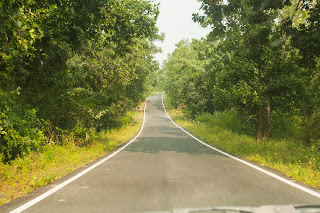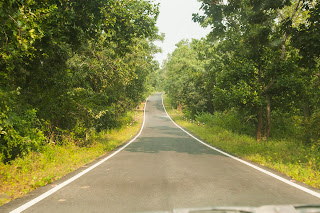A Hidden Gem: A Scenic Drive Through Jharkhand’s Untamed
Beauty #Travel #India #ForestRoads
Imagine
cruising down a smooth, serpentine highway that cuts through a cool, dense
forest. The air is fresh, the only sound the whisper of leaves and the
occasional chirp of unseen birds. This wasn’t a scene from a movie, but a
delightful surprise I encountered on a recent election tour in Jharkhand.
While traveling
through the western part of the state, our path led us onto a seemingly
forgotten highway. This wasn’t your typical bustling thoroughfare; it was a
quiet feeder road, perfect for a leisurely drive. The surrounding forest,
stretching for about 40 kilometers between Manika and Herhanj, was a captivating
sight. Towering trees formed a dense canopy, and the occasional glimpse of a
small hamlet offered a peek into rural life.
The smooth
road, perfect for cruising, fueled my hope of spotting some wildlife.
Unfortunately, the day’s adventure lacked that particular thrill. However, a
chat with locals at a roadside Dhaba revealed that elephants, monkeys, and even
wild gaur (Indian bison) are sometimes seen in the area.
This encounter
sparked a curiosity about the intricate network of roads that traverse India’s forests.
These roads can be broadly categorized into main roads, secondary roads, and
feeder roads. While they serve a purpose in terms of accessibility and
development, they can also disrupt the delicate balance of the ecosystem.
Balancing
Needs: Humans and Wildlife
The
construction of roads through forests presents a constant challenge – how to
balance human needs with the preservation of nature. Thankfully, there are
initiatives underway to minimize the impact on wildlife. These include:
- Wildlife corridors: Building structures like
culverts, overpasses, and viaducts allows animals to safely cross roads
without hindering traffic flow. - Barriers and deterrents: Guard walls, fencing, and
vegetative barriers help keep wildlife off the roads. - Light and sound mitigation: Measures like using anti-glare
lights and sound barriers minimize disturbance to animals.
A prime example
of such efforts is the 16-kilometer elevated corridor over the Pench Tiger
Reserve on NH-44. This innovative solution allows for safe passage for both
humans and animals.
Jharkhand’s
Untamed Beauty
Jharkhand
boasts a wealth of stunning natural treasures, including national parks, tiger
reserves, and wildlife sanctuaries. Some of these gems include:
- Betla National Park
- Palamu Tiger Reserve
- Horap Jungle
- Dalma Wildlife Sanctuary
- Netarhat (Queen of Chotanagpur)
- Birsa Zoological Park
- Topchanchi Wildlife Sanctuary
- Hazaribag Wildlife Sanctuary
These
captivating destinations offer a glimpse into the heart of India’s wilderness,
making them a must-visit for any nature enthusiast.
Plan Your
Adventure!
Jharkhand’s
hidden highway and the state’s diverse wildlife sanctuaries offer a unique
travel experience. If you’re looking for a road less traveled, consider adding
this region to your travel bucket list. Remember, responsible tourism is key to
ensuring the continued beauty of these natural wonders.
Picture of the Manika – Harhanj Highway.
Text and Photo
by Ashok Karan, Ashokkaran.blogspot.com
Please like,
share, and subscribe!
#Nature
#Wildlife Conservation #Responsible Tourism



Leave a Reply